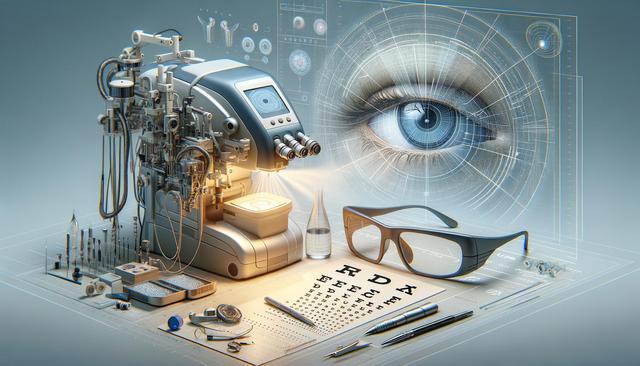What Is Laser Myopia Surgery?
Laser eye surgery, often referred to as laser myopia surgery, is a widely used medical procedure designed to correct refractive vision issues such as nearsightedness (myopia). The procedure involves reshaping the cornea using a precise laser to improve the eye’s ability to focus light correctly on the retina. By adjusting the curvature of the cornea, laser surgery can reduce or, in many cases, eliminate the need for glasses or contact lenses. There are different types of laser eye procedures, with LASIK and PRK being two of the most commonly performed techniques. Each approach has slight variations in method, but both aim to achieve clearer vision through minimally invasive means.
Laser surgery is typically performed on an outpatient basis and is known for its relatively quick process. Most procedures take less than 30 minutes, and patients can often return home the same day. The technology behind laser eye surgery has evolved significantly, making it a highly refined and well-established option for vision correction. Before undergoing the procedure, a detailed eye examination and consultation are necessary to ensure the patient’s eligibility and to tailor the treatment to the specific characteristics of their eyes.
Who Is a Suitable Candidate?
Determining whether laser eye surgery is suitable for you depends on several factors. Generally, ideal candidates are adults over the age of 18 who have had a stable vision prescription for at least one year. A comprehensive eye exam conducted by a qualified specialist will assess your suitability based on corneal thickness, eye health, and overall medical history. While the procedure can be highly effective, it is not recommended for everyone. Certain conditions or lifestyle factors may make other vision correction options more appropriate.
Some characteristics of suitable candidates include:
- Stable vision prescription for at least 12 months
- Good general eye health with no signs of cataracts or glaucoma
- Sufficient corneal thickness to support reshaping
- No autoimmune diseases or conditions that impair healing
Patients with high degrees of myopia, extremely thin corneas, or chronic dry eye may need to explore alternative solutions. A personalized assessment will help determine the most effective and safest approach for each individual case.
Understanding the Safety of Laser Eye Surgery
Laser eye surgery is considered a safe and effective procedure when performed by experienced professionals using modern technology. As with any medical procedure, there are potential risks, but complications are relatively rare. Improvements in equipment and techniques have significantly reduced the likelihood of adverse effects. Most complications, when they do occur, are mild and temporary. These may include dry eyes, glare, or halos around lights, especially at night. In rare cases, undercorrection or overcorrection may require additional treatments.
To ensure safety, clinics follow strict protocols that include:
- Thorough pre-operative screenings
- Use of FDA-approved laser systems
- Precise calibration and sterilization of equipment
- Close monitoring during and after the procedure
Patients should follow all pre- and post-operative instructions carefully to minimize risks and support proper healing. Open communication with the eye surgeon and a clear understanding of the process can also help ease concerns and improve outcomes.
Possible Side Effects and Considerations
While laser eye surgery has a high satisfaction rate, patients should be aware of possible side effects and temporary discomfort during recovery. Most side effects are short-lived and resolve within weeks, but understanding what to expect can help patients prepare and respond appropriately. Common side effects may include:
- Dry or itchy eyes
- Blurry vision immediately after the procedure
- Light sensitivity
- Visual disturbances like halos or glare
These issues typically subside as the eyes heal. Lubricating eye drops and protective eyewear may be recommended to ease discomfort and shield the eyes during the early recovery phase. In some cases, patients may experience a longer adjustment period depending on their initial prescription and individual healing response. It’s important to attend all scheduled follow-up appointments to monitor progress and address any concerns promptly.
Informed consent is a critical step in the process. Patients should take the time to ask questions and fully understand potential outcomes, both positive and negative. This ensures realistic expectations and greater satisfaction with the results.
Recovery and Long-Term Results
The recovery period following laser myopia surgery is typically short, with many patients noticing clearer vision within 24 to 48 hours. However, complete visual stabilization may take several weeks. During this time, the eyes continue to heal and adjust to their new shape. Patients are usually advised to rest their eyes, avoid strenuous activities, and protect their eyes from dust, bright light, and water exposure for the first few days.
Typical recovery guidelines include:
- Avoid rubbing the eyes for at least a week
- Use prescribed eye drops to prevent infection and promote healing
- Wear sunglasses outdoors to reduce light sensitivity
- Avoid swimming or hot tubs for two weeks
Long-term results from laser eye surgery are generally positive, with many patients achieving 20/20 vision or close to it. While the effects are intended to be permanent, natural changes in vision due to aging, such as presbyopia, may still occur later in life. Regular eye exams remain essential for maintaining eye health even after surgery. In some cases, an enhancement procedure may be needed years later if vision shifts slightly. Overall, laser surgery offers a convenient and effective solution for those seeking freedom from glasses or contacts.
Conclusion: Making an Informed Decision
Laser myopia surgery is a well-established and effective option for eligible individuals looking to improve their vision and reduce dependence on corrective lenses. By understanding the procedure, assessing personal suitability, and weighing potential risks and benefits, patients can make informed choices tailored to their needs. Consulting with a qualified eye care professional is the critical first step in this journey. With careful planning and realistic expectations, many individuals experience significant visual improvement and enhanced quality of life through modern laser vision correction.







